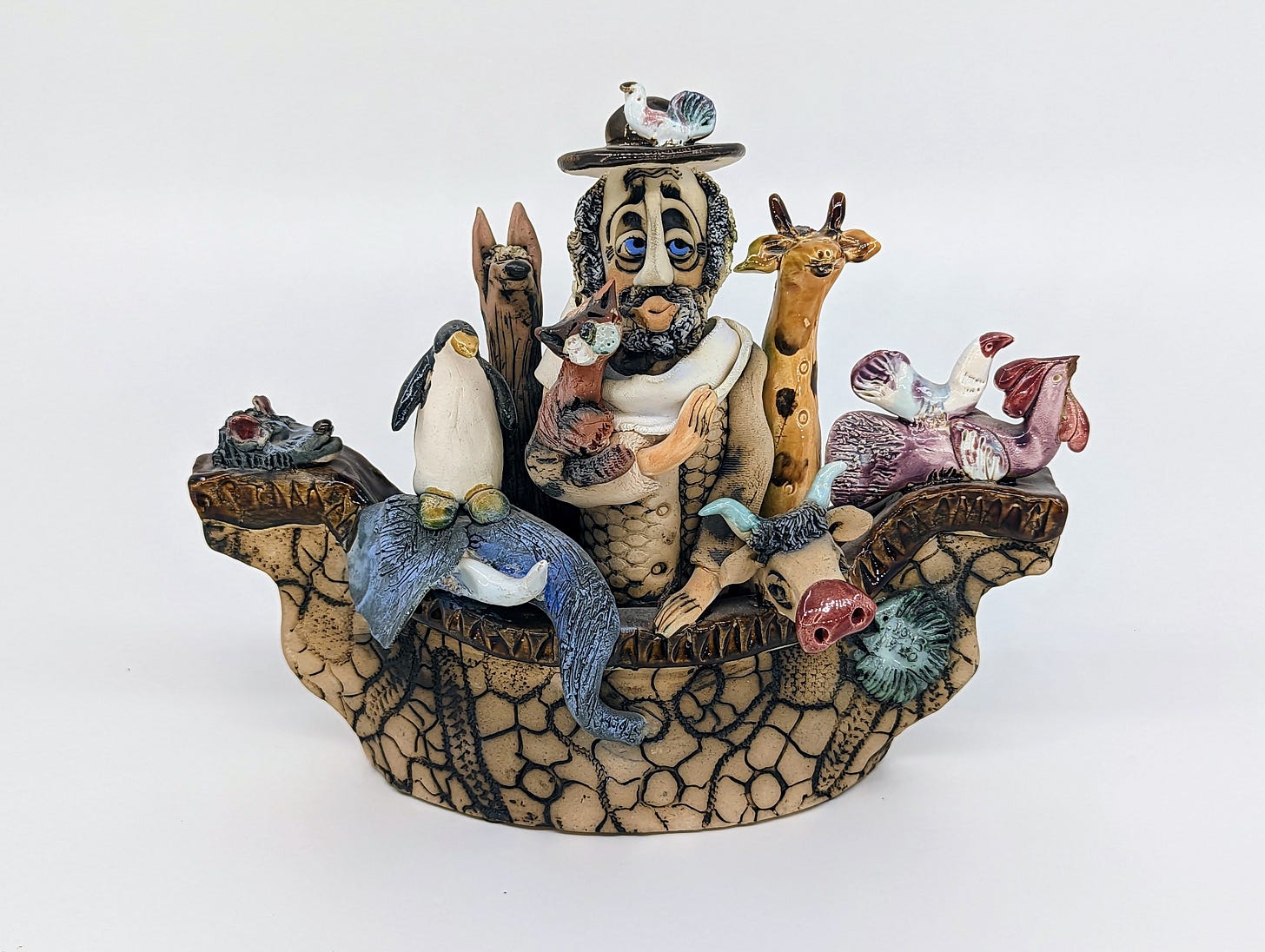Noah and Charedi Draft-Dodgers
Two separate topics... or are they?
(Above: A chassidic Noah on his ark, by Israeli artist Tanya Lombrozo, on exhibit at the Biblical Museum of Natural History)
Some people claim that I’m singularly obsessed with the topic of charedim and army. Inevitably, these are people in charedi society whose children are not in the army. With those people in Israel who are part of wider society in which tremendous and terrible sacrifices are being made, they are generally likewise intensely upset about the charedi lack of participation, which causes everyone else to pay an even higher price.
But meanwhile, it’s just not true that this topic is my singular obsession. I have lots of obsessions! Including, most prominently, Noah’s Ark.
Meanwhile, wouldn’tcha know it, a reader pointed me to a fascinating discussion which relates Noah to the religious outlook that lies at the foundation of the charedi worldview! This is from Rabbi Meir Simcha HaKohen of Dvinsk (1843-1926) in Meshech Chachma, and occurs in the context of discussing a Midrash:
“A man of the earth” (Gem. 9:20) - Moshe is more beloved than Noah. Noah went from being called “a righteous man” to “a man of the earth,” whereas Moshe went from being called “an Egyptian man” to “a man of God.” (Midrash Bereishis Rabbah 36:3)
The author of Meshech Chachma elaborates:
The explanation is that there are two paths in the service of God. One is that of someone who secludes himself in devotion to Divine service, and another is that of someone who busies himself with communal needs, and who negates and sacrifices himself for the sake of the nation.
Now, this would mean that the person who secludes himself and devotes himself to Divine service would constantly rise in his level of spirituality, while the other would decline. And that is what is said in Koheles Rabbah that “the engagement of Torah scholars disturbs their wisdom” - that Rabbi Yehoshua ben Levi forgot sixty halachos because he was busy with community needs.
Yet nevertheless, we find that because Noah secluded himself and did not attempt to straighten out the people in his generation, it was said about him that he was also worthy of elimination. And his seclusion meant that after being called a righteous man, he fell from this level, and was called a man of the earth. Whereas Moshe was originally called an Egyptian man, pointing to a deficiency in his soul, but since he put himself out on behalf of Israel in killing the Eygptian (who had been beating the Israelites), he is called a man of God, who attained the ultimate level of perfection that a man can reach.
This is strikingly powerful. The Meshech Chochma is saying that Judaism is not just about learning Torah and spiritual growth. If those come at the expense of helping with urgent communal needs, then they are a shortcoming, not a praiseworthy path. Rabbi Yehoshua ben Levi forgot sixty halachos because he was busy with community needs, but this doesn’t mean that he shouldn’t have attended to them! Sacrificing such Torah study and spiritual growth in order to help save lives is the true service of God.
You can’t get any clearer than that. And the application of it to our current situation is obvious. Learning Torah and attaining personal spiritual growth at the cost of refusing to help with the most criticual survival needs of the nation has no true Divine value. The real avodas Hashem is being done by those who make sacrifices on behalf of the nation. They are the ones who follow in the path of Moshe Rabbeinu.
Please forward my posts to people for whom you feel it would be beneficial. A full list of my posts on the topic of IDF service is at Torah and Army: The Big Index




I still remember a Kol Nidre drasha of the Rabbi of my shul in the Bronx, Rabbi Akiva Predmedsky o.b.m., from around 45 years ago! He spoke about the mishnah that says that, if the Kohen Gadol wasn't learned and couldn't study by himself all night, they would read to him the entire night of Yom Kippur, so that he shouldn't fall asleep. The three books that they would read to him were: Iyov, Ezra, and Divrei Hayamim.
Rabbi Predmedsky explained that Iyov symbolizes a person who was involved primarily in his own spiritual well-being. He would offer sacrifices on occasion for his children, but he wasn't involved much in improving others.
Ezra, on the other hand, devoted all of his energies to leading the Jewish people back from the exile and resettling the Land of Israel.
And the book of Chronicles contains lists of genealogies and names of people of varying levels of significance in Jewish history.
If I remember the final vort correctly, the message was that the Kohen Gadol was supposed to reflect on what type of role model does he want to be: someone who devotes the majority of his energies to his own spiritual advancement, or to the community, or just enough to only receive "honorable mention" in the chronicles of the Jewish people.
Interesting. The Meshech Chochma’s underlying message is likely partially rooted in the traditional Jewish critique of Christian monasticism